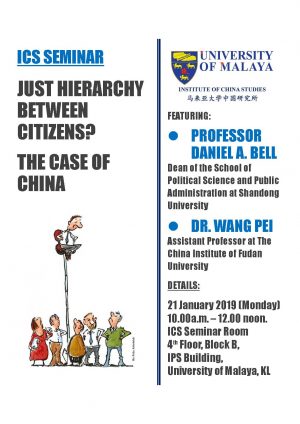Date
January 21, 2019
Time
10.00 a.m. - 12.00 noon
Venue
ICS Seminar Room, 4th Floor, Block B, IPS Building, University of Malaya, Kuala Lumpur
Language
English
Speaker :
Daniel A. BELL
Dean of the School of Political Science and Public Administration at Shandong University
WANG Pei
Assistant Professor at The China Institute of Fudan University

How is it possible to justify hierarchies between citizens – mainly strangers to each other – in modern large scale political communities? It is a special challenge to justify hierarchies in political systems that do not employ voting mechanisms that (equally) empower citizens to change their rulers every few years. We argue that hierarchies between rulers and ruled in such communities are justified if the political system selects and promotes public officials with above average ability and a willingness to serve the political community over and above their own private and family interests. We have the Chinese political context in mind, and we argue this kind of ideal – what we call “political meritocracy” -- helped to inspire the imperial political system in China’s past and Chinese political reformers in the early twentieth century and may help to justify the political system in China today. However, the system needs to be accompanied by democratic mechanisms short of competitive elections at the top that allow citizens to show that they trust their rulers and that provide a measure of accountability at different levels of government. In the Chinese context, however, there is a large gap between the ideal and the reality, and we argue that a judicious mixture of Confucian-style ‘soft power’ combined with democratic openness, Maoist-style mass line, and Daoist-style skepticism about the whole political system can help to reinvigorate political meritocracy in China.
Last Update: 16/03/2022